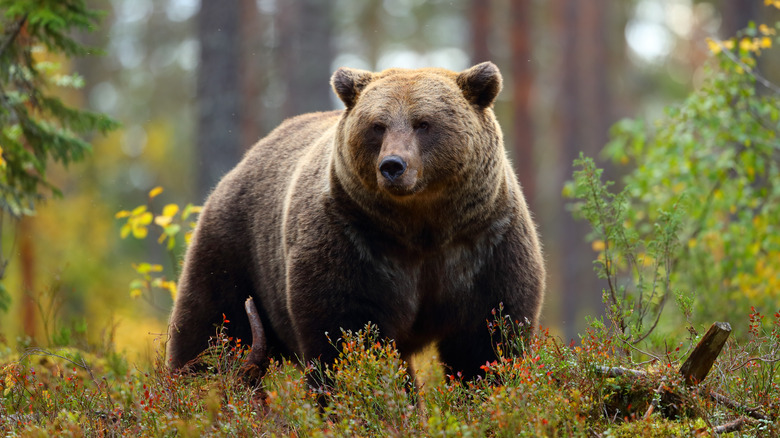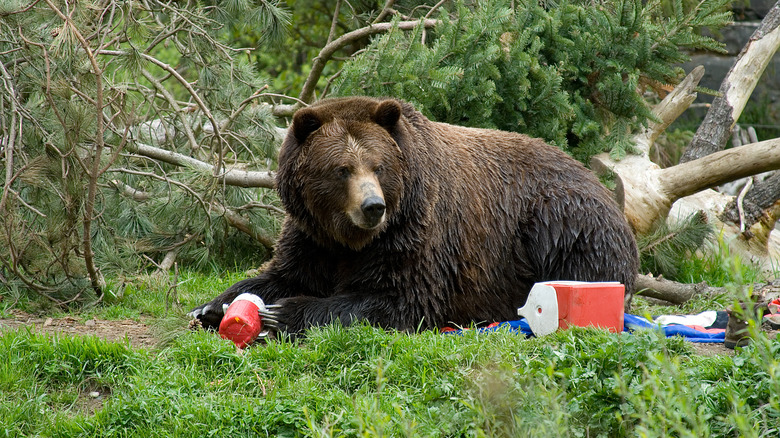Always Do This To Your Clothes After Cooking When You're Camping In Bear Country
Cooking at a campsite can be messy business. You're already outside, among the bugs and leaves. If you hiked or paddled there, you may have an earthy aroma. The campfire gushes smoke into your face, and you're laying meat and veggies over a warped iron grill, which probably hasn't been thoroughly washed in years. You stuffed all the ingredients into your backpack, and now they're spread out across the picnic table — a chaotic mishmash of opened packages and Spartan cookware. This is nothing like your organized kitchen back home, where you can easily switch on the stove, pull items out of the refrigerator, and wash your hands under a faucet. There are some simple steps you can take for hassle-free cooking while camping, but ultimately, there's a good chance you're going to spill something on yourself.
This wouldn't matter in many situations. Maybe a dollop of ketchup ends up on your shirt. Maybe breadcrumbs stick stubbornly to your wool sweater. Maybe you eat half your granola bar and stuff the rest in your pocket for later. These are all innocent events — unless you're in bear country, where the slightest whiff of food could put you in a dangerous situation.
If you think your backwoods barbecue smells delicious, be aware that North American bears have a sense of smell over 2,000 times more powerful than ours. More than any other organ, bears use their noses to track down food. Iconic national parks become dangerous camping destinations when visitors aren't careful about their edible supplies — and although we may carefully store our victuals in a bear vault or suspended sack, we often forget about the clothes we're wearing. In short, if your shirt smells like salmon, a grizzly may very well assume that's what it is.
What to do if your clothes smell like food in bear country
If you have any concerns about the food smells emanating from your clothes, change into something else. This is especially important at night, when campers drift off to sleep and are most likely to be visited by hungry predators. Clothing is especially concerning because it's literally stuck to your body, and a confused bear won't make a distinction between a T-shirt with the odor of bacon and the tasty human flesh underneath. In general, campers in bear country should plan to store their food as far from their tent as they reasonably can; several techniques are effective for preventing bears from eating your breakfast, and many campgrounds have animal-resistant food lockers on the premises. If you can't wash your soup-splattered clothes right away, consider storing them with your provisions.
The truth is, bear attacks are pretty rare: The entire continent of North America usually sees about a dozen attacks per year, and few of these are fatal. It's true that bears have little interest in humans, and a little noise will scare most of them away. Still, a 1,500-pound Kodiak is not an adversary anyone wants to challenge, especially in spring, when it's just woken from hibernation and must replenish 15% of its body weight. Entering bear country requires some preparation, and you're wise to bring noisemakers, sealable canisters, and bear spray to avoid becoming an entrée.
Meanwhile, cooking outdoors is also an art, and many people struggle to adjust. Do you use a propane stove or an open fire? What supplies can you carry in your backpack for multiple days? If you have many mouths to feed, how should you divide up the weight of all that food? To help out, here are some practical TikTok tips that make cooking while camping easier.

